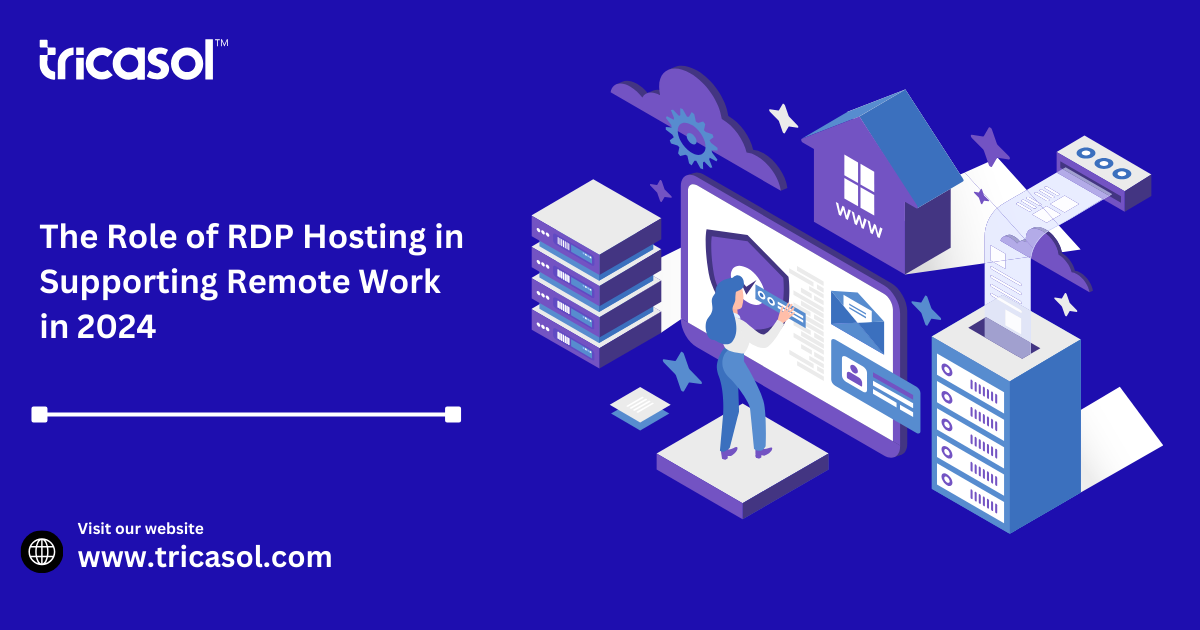Overview of Remote Work Trends
RDP (Remote Desktop Protocol) has become crucial for businesses transitioning to remote work.
Importance of RDP Hosting in Modern Work Environments
RDP Windows Server plays a pivotal role by allowing users to access a centralized Windows Server environment remotely, making it easier to manage and secure remote work setups.
Enhancing Remote Access
Global Accessibility and Connectivity
RDP is useful for connecting to their work desktops from anywhere in the world, providing global accessibility and seamless connectivity.
Device Compatibility and Flexibility
With RDP Windows Server, users can connect from various devices (laptops, tablets, smartphones) without installing specific applications on each device, enhancing flexibility and user experience.
Shared Resources and Centralized Access
RDP Windows Server facilitates sharing resources, such as files and applications, by providing a centralized environment .
Integration with Collaboration Tools
RDP can enhance integration with tools like Microsoft Teams and Slack, allowing users to collaborate seamlessly while accessing their Windows Server environment remotely.
Ensuring Robust Security
Advanced Encryption and Data Protection
RDP employs encryption protocols to protect data transmitted between the client and the server, ensuring that sensitive information remains secure during remote sessions.
Multi-Factor Authentication and Secure Access Controls|
Many RDP Hosting solutions are designed to comply with industry standards and regulations, such as GDPR and HIPAA, helping businesses meet their legal and regulatory requirements.
Streamlining IT Management
Centralized Administration and Monitoring
RDP Windows Server allows IT administrators to manage and monitor all remote sessions from a centralized location, simplifying administrative tasks and improving efficiency.
Automated Updates and Maintenance
Administrators can perform updates and maintenance on RDP Windows Server environments remotely, reducing the need for physical access and ensuring that systems are kept up-to-date.
User Management and Access Control
RDP provides tools for managing user permissions and access controls on Windows Servers, allowing IT departments to set policies and restrict access as needed.
Seamless Application Access
RDP Windows Server enables users to access their work applications and desktop environments as if physically present, facilitating uninterrupted workflows and boosting productivity.
Performance Optimization and Reliability
The latest enhancements in RDP technology aim to optimize performance, providing a smooth and reliable remote desktop experience even for demanding applications.
Reduced Downtime and Disruption
By using RDP Windows Server, businesses can minimize downtime and disruptions, as employees can quickly regain access to their work environments even if they encounter issues with their local devices.
Cost Efficiency and Budget Management
Cloud-Based Cost Savings
Many RDP hosting providers offer scalable pricing options, enabling businesses to adjust their usage based on current needs and avoid overpaying for unused resources.
Reduced Infrastructure and Maintenance Costs
Utilizing RDP Windows Server Hosting reduces the need for physical hardware and on-site maintenance, resulting in lower overall infrastructure and support costs.
Support for Remote Work Preferences
With RDP, employees can maintain their preferred work environment and access the same desktop setup remotely, enhancing job satisfaction and productivity.
Enhanced Work-Life Balance through Flexibility
Working remotely with RDP gives employees the flexibility to work from various locations.
Addressing Challenges and Considerations
Common Issues in RDP Hosting
Potential challenges with RDP include latency issues, security vulnerabilities, and the need for reliable internet connections.
Best Practices for Troubleshooting and Support
Implementing best practices for troubleshooting RDP issues, such as monitoring performance and providing adequate support, helps ensure that remote work setups remain functional and efficient.
Balancing Security and Usability
To ensure that remote work environments are secure and user-friendly, it’s essential to balance RDP Windows Server’s security features with usability.
Future Trends in RDP Hosting
Future developments in RDP technology performance, security, and user experience.
Impact of AI and Machine Learning on RDP
RDP environments by automating tasks, predicting issues, and improving overall efficiency.
Predictions for the Future of Remote Work
RDP technology will likely advance as remote work evolves, offering new features and capabilities to support the changing needs of businesses and employees.
Case Studies and Success Stories
Examples of Businesses Using RDP Hosting Effectively
RDP Windows Server solutions can provide valuable insights and inspiration for other organizations.
Lessons Learned from Successful Implementations
Analyzing lessons learned from these case studies can help businesses understand best practices and avoid common pitfalls when adopting RDP solutions.
Choosing the Right RDP Hosting Solution
Consider scalability, security, and cost factors when selecting an RDP Windows Server hosting solution to ensure it meets your business needs.
Implementing Best Practices for Remote Work
Adopting best practices for managing and securing RDP environments can help businesses maximize the benefits of remote work while minimizing potential issues.
Conclusion
Recap the critical benefits of RDP and RDP Windows Hosting services in supporting remote work, including accessibility, security, productivity, and cost efficiency.
Emphasize the importance of leveraging RDP technology to create a successful and flexible remote work environment that supports business growth and employee satisfaction.

